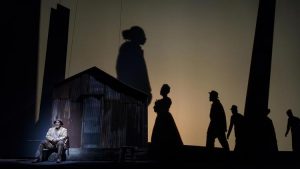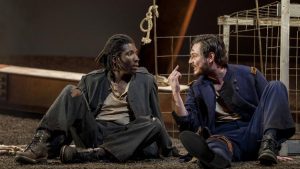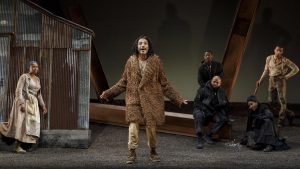
Stephen Anthony Jones as the Oldest Old Man (Part 1) Photo by Joan Marcus
When Suzan Lori-Parks’s Civil War-era rewriting of the Odyssey first played at the Public in 2014, I didn’t make it — despite reading Christopher Isherwood’s rave that it was the best new play of the year. I was holding tickets to the Saturday preview in New Haven for March 17 this year, but that show was cancelled b/c a storm delayed moving the set into town. But I was — finally! — able to see the three-hour epic last night at Yale’s University Theater. I wondered if it could possibly live up to the hype.
It did. Almost entirely, and especially in the incandescent, hilarious, shocking third act. What a show!
I’m in the middle of a dense three-play run of my own right now, with Theater for a New Audience’s Winter’s Tale in Brooklyn tonight and the RSC Lear on Tuesday at BAM. So just a few quick notes about this amazing, inventive Beckett-meets-Homer-as-history-play masterpiece.
Part 1: The Measure of a Man
The slave Hero, played with charisma and power by James Udom, sat in the Odysseus role, but in the first part he’s faced with the choice of Achilles: will he or won’t he go to the wars? His decision revolved around the conflicting advice of his adopted father, “The Oldest Old Man,” played by Stephen Anthony Jones, and his de facto wife Penny, played by Eboni Flowers. The Old Man advised Hero to go for glory but Penny wanted her man home. This triangular debate got disrupted by the wild card of a maimed character named Homer, played by Julian Elijah Martinez. Homer’s connection to his Greek namesake wasn’t yet clear, but it turned out that Hero was the one who cut off Homer’s foot years ago, when the “boss master” forced him to cripple his friend after Homer had tried to escape. The threat of violence — including a scene in which Hero’s naked foot waits for the knife — lingered.
Part 2: A Battle in the Wilderness

James Udom as Hero and Tom Pecinka as Smith (Part 2) Photo by Joan Marcus
The second part, set during the war, featured a triangular conversation between the boss-master Colonel, played with comic and moving gusto by Dan Hiatt, Hero, and Union prisoner Smith, played by Tom Pecinka. Punctuated by cannon blasts that indicate the near arrival of both armies, the three men explored service, loyalty, and race, with banjo accompaniment. The Colonel’s hymn to whiteness seemed as if it would mark a painful high point for this episode — but then Smith’s attempt to woo Hero into escaping to a black Union regiment topped that.
Part 3: The Union of the Confederate Parts
After an intermission and already two hours in, I recognized the pattern the play was building: long, somewhat leisurely scenes that grew into crescendo. The second Part topped the first, and while I figured that for Part 3 we’d be back at the slave cabin where we’d started, it wasn’t clear how Lori-Parks could exceed the intensity of Part 2, framed by cannons and with Smith’s wounded and festering leg as a dramatic focus. I should not have worried.
The last part started back home, and Homer — whose parallel in Greek epic wasn’t clear in part 1 — turned out to be the Suitors! But, in a twist, he’s a loving suitor and real alternative to wandering Ulysses. The go-or-not choice in Part 3 belonged to Penny. Homer convinced her at one point to escape with him and other runaways to the north and freedom. But then the returning warriors came home, starting first not with Hero but Odd-sea Dog, played brilliantly with comic excess, frequent requests for belly rubs, and shaggy dog-storifying by Gregory Wallace. The dog kept everyone guessing about whether Hero survived the war that killed the boss-master for so long that I thought maybe the twist would be that only the dog made it home — but no, Hero, who had now taken the name Ulysses after the Union general, returned. The third of three triangles featured Ulysses, Homer, and Penny. I won’t spoil the surprise, or the joy, of the ending — except to say that the story will go on.

Gregory Wallace as Odyssey Dog (Photo by Joan Marcus)
Lori-Parks says she’s going to write six more parts of this epic for a total of nine, so we should get to hear more about Penny, Homer, Ulysses, Odyssey Dog, and the rest. I can’t wait! We’re lucky to be living through the production of great art.